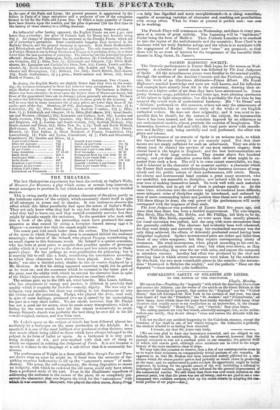SACRED HARMONIC SOCIETY.
The Oratorio performances in Exeter Hall began for the season on Wed- nesday. A selection of sacred music was followed by The Last Judgment of Spohr. All the miscellaneous pieces were familiar to the musical public, through the medium of the Ancient Concerts and the Festivals, excepting one, the work of an illustrious dilettante—Prince Albert. His Royal Highness's musical knowledge and taste are well known, and his influence and example have already been felt in the aristocracy, drawing their at- tention to a higher order of art than they have been accustomed to. Some pretty German songs, published several years ago, were pleasing specimens of his talent in light composition; but this is probably the first time he has essayed the severe style of ecclesiastical harmony. His " Te Deum" and " Jubilate," performed on this occasion, evince not only the attainments of a sound musician, but an assiduous study of the works of our. English cathedral writers. He does not show originality, and it was neat to im- possible that he should; for the nature of the, subject, the innumerable times it has been treated, and the restraints imposed by- an adherence to our ecclesiastical models, almoSt preclude the exercise of imagination. The harmonies, however, are full and solid; the vocal parts move with smooth- ness and facility; and, being carefully and well performed, the effect was grave and solemn.
The performance of an oratorio of Spohr is an arduous task, to which the Sacred Harmonic Society is as yet scarcely equal. Not that their means are not amply sufficient for such an acIalevment. They are able to obtain (and do obtain) the services of our most eminent singers; their choral band is the largest in England; and the best instrumentalists are employed' in their large orchestra. They muster above five hundred strong; and yet their collective power falls short of what might be ex- pected from such a host. The evil is to some' extent unavoidable, we fear, and. is inherent in the character of an amateur society; a character which the Exeter Hall meetings, notwithstanding their immense increase of mag- nitude and the public nature of their performances, still retain. Hence, the chorus and instrumental band contain a great many amateurs, who are unskilful, not. amenable to discipline, and imbued with the true ama- teur love.of making themselves heard. To-work well with such materials- in impracticable, and to get rid of them is perhaps equally so. At the same time, admission into the orchestra might be rendered mere difficult; more stringent rules of discipline might be introduced, and enforced by men of more commanding talent and position than those now in authority. Till these things be done, the real power of the performances will never correspond with the largeness of their scale.
The Last Judgment was performed at Exeter Hall five years ago, and since that time there has been a decided improvement. The solo-singers, Miss Birch, Miss Dolby, Mr. Hobbs, and Mr. Phillips, left little to be de- sired. With,Miss Birch, especially, we were more than usually pleased:. her vocal execution was perfect, and she sang with more earnestness than she generally exhibits. The choruses had evidently been well rehearsed; for they were firmly and correctly sung; but mechanical accuracy was the only thing achieved, the effects of delicately graduated sound having been altogether neglected. Spohr's instrumental parts are richer. and fuller than those of any other composer; but they require corresponding nicety of treatment. His wind-instruments, when played according, to his own in- tentions, are perfectly smooth and clear; but when over-blown, as they, were on Wednesday, they stun_ the ear with noise, and expose the composex to mistaken censure. Another bad effect was produced by the slow and drawling time in which several movements were taken by the conductor. By this fault, the two most remarkable pieces in the oratorio—the Uemen- dons " Destroyed is Babylon the mighty," and the pathetic Blest axe the departed "—were rendered quite ineffective.


























 Previous page
Previous page